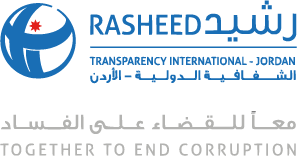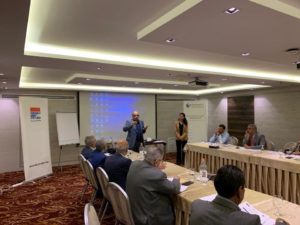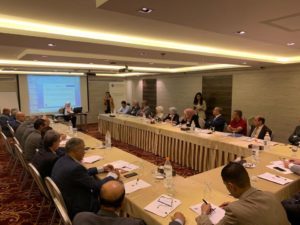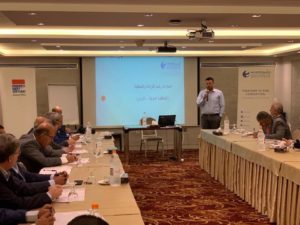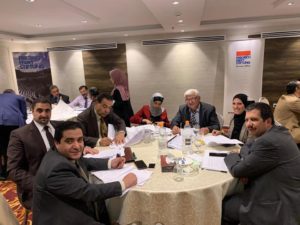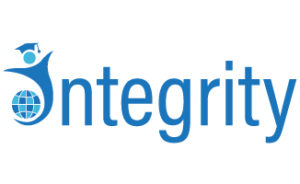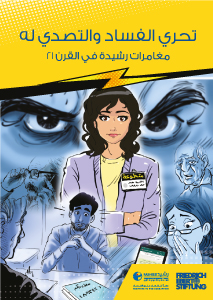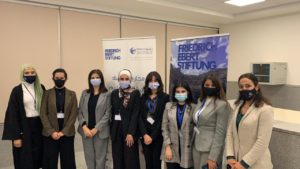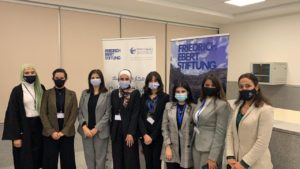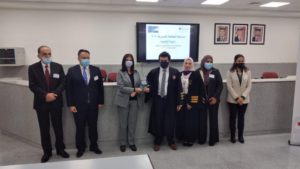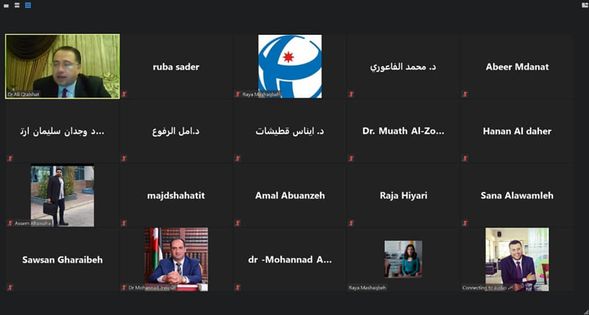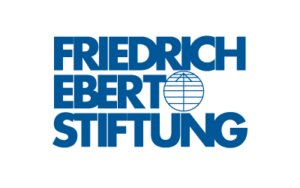Fighting Corruption through Education Project
Brief
The project “Fighting Corruption through Education” aims to enhance the political and democratic understanding of society through youth, as they are the builders of the future, in addition to their political and democratic participation by promoting the values of transparency, integrity and good citizenship. Also promoting freedom and democratic practices by explaining the concepts of transparency, integrity and good governance within society, to build a culture of societal accountability, in partnership with the German Friedrich Ebert Foundation.
Outcomes/Activities
Integrity and Anti-Corruption Curriculum
Rasheed for Integrity and Transparency (Transparency International-Jordan) launched the “Integrity, Accountability, Transparency and Anti-Corruption” curriculum for public and private universities in coordination with the Ministry of Higher Education, through the project “Fighting Corruption through Education” in partnership with the “Friedrich Ebert Foundation.”
The launch was held in the presence of a number of university presidents or their representatives, where curriculum topics and goal of its development were discussed.
The curriculum was developed by a number of Jordanian academics specialized in this field, in the development of this curriculum comes to support the implementation of the second objective of the National Integrity and Anti-Corruption Strategy (2017-2025), which is concerned with preparing the national environment for participation in the fight against corruption through national awareness of society, institutions and individuals.
The curriculum was created to be taught at Jordanian universities, and focuses on the aforementioned concepts and their dimensions, in addition to analyzing the National Integrity System through identifying the work of each of its bodies, showcasing also related Jordanian legislation and discussing the most significant international standards that government combating corruption, which are included in the UN Convention against Corruption
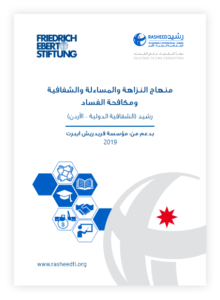
Teaching Strategies for University Professors
Rasheed for Integrity and Transparency (Transparency International – Jordan “, in cooperation with the Friedrich Ebert Foundation and in coordination with the Ministry of Higher Education and Scientific Research, held a two-day training program on the teaching strategies for the Integrity, Accountability, Transparency and Anti-Corruption Curriculum for Universities.
Where 30 professors from the elite of public and private universities participated in the training program, the latest teaching strategies were discussed, and practical exercises were implemented from the topics of the aforementioned curriculum.
This Activity is a part of the “Fighting Corruption through Education” project that aims to support the implementation of the second objective of the National Integrity and Anti-Corruption Strategy (2017-2025), which is concerned with preparing the national environment to participate in the fight against corruption through national awareness of society, institutions and individuals.
A website has been created that contains the project outputs.
Preparing and printing a Comic book on anti-corruption.
Training law students from Jordanian universities on the skills of Moot courts and holding a moot court competition.
Rasheed for Integrity and Transparency (Transparency International-Jordan) held a moot court competition for law students in Jordanian universities; following a training, they received in mid-November 2020 to learn the necessary skills for pleading in court.
The competition was organized in cooperation with the Friedrich Ebert Foundation and the Jordan Integrity and Anti-Corruption Commission (JIACC), and was held at the Judicial Institute of Jordan, inaugurated by Director General of the institute Judge Nawal Al Jawhari and Executive Director of “Rasheed” Abeer Mdanat.
The jury included law professors at Jordanian universities as well as practicing judges and lawyers, and the competition saw the participation of teams from the University of Jordan, the Middle East University, Mutah University, and the World Islamic Sciences and Education University, in addition to a separate single team.
The award for the best pleader in the defense went to Saba Qaralleh, while the award for the best pleader in the prosecution went to Raghad Quteishat, while the award for the best pleader in the final round went to Omar Ajlouni. The University of Jordan team won the first place, while the World Islamic Sciences and Education University’s team won the second place.
All participating teams have shown brilliant and superb performance and skills in pleading through their efforts and the skills they obtained through Rasheed’s training sessions.
Holding training on international anti-corruption
Rasheed for Integrity and Transparency in cooperation with Ebert Foundation and the Jordan Integrity and Anti-Corruption Commission held an intensive training session on combating corruption and the related and that’s through the “Fighting Corruption through Education” project.
The session was attended by top-notch academic staff members in Jordanian universities, and introduced the anti-corruption concepts and the related national laws, discussing also four international agreements that Jordan has signed.
These include; the United Nations Convention against Corruption; the Arab Anti-corruption Convention; the Arab Convention against Transnational Organized Crime; and the Jordanian-Spanish Cooperation Agreement to combat Crime.
Moreover, the session focused on the role of boosting human rights and democracy in combating corruption, especially in the International Covenant on Civil and Political Rights as well as the International Covenant on Economic, Social and Cultural Rights.
The intensive training gave room to the participants to exchange their expertise, which helps them in identifying processes that lead to corruption and understand the most significant international efforts exerted in the field. This will allow the educators to learn how to combat corruption through legislation, limiting its spread and danger, and thus they can create a practical material for a university curriculum to teach to their students.
The session was held in continuation of a session on 2019, targeting university lecturers and focusing on modern tools and strategies of teaching the curriculum on the concepts of “integrity, transparency, accountability and combating corruption”, according to Executive Director of Rasheed Abeer Mdanat.
The curriculum was created to be taught at Jordanian universities, and focuses on the aforementioned concepts and their dimensions, in addition to analyzing the National Integrity System through identifying the work of each of its bodies, showcasing also related Jordanian legislation and discussing the most significant international standards that government combating corruption, which are included in the UN Convention against Corruption, Mdanat said.
The training is also considered a part of the continuous efforts to support the implementation of the second goal of the national integrity and anti-corruption strategy (2017-2025), she added.
The goal revolves around preparing a national environment that allows participation in the efforts to combat corruption through raising awareness of society, individuals and institutions, Mdanat concluded.

